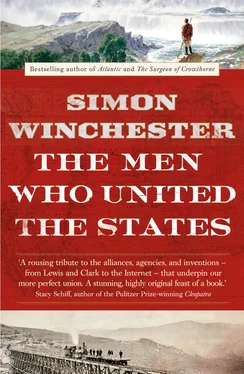And then Sacagawea spotted a prominent rock, which she said her Shoshone people had named the Beaver’s Head, since from some angles it resembles such a thing. But she had actually made a mistake, so excited was she to give the good news. The real Beaver’s Head rock was another day’s passage upstream. Nonetheless, she was right to exclaim that they were now deep in her own remembered tribal territory. And so they were now also very close to the Continental Divide, the ridgeline that separates the streams that flow down eventually into the Gulf of Mexico or the Atlantic Ocean—like the Jefferson, its tributaries, and all the rivers below—from those that flow down eventually into the Pacific. They were close, in other words, to the expedition’s topographic and spiritual tipping point.
Lewis, who had gone on ahead, was the first to cross. Coming up from the streamside, he had seen an Indian on horseback standing in the trees and tried to make small talk. But the man had looked down in silence at all of Lewis’s attempts at friendship—unrolling a blanket, scattering gifts on it, offering his rifle, spreading his hands and showing he meant no harm—and then turned away, took off at a smart canter, and vanished into the brush. In doing so the man inadvertently led Lewis toward a hitherto unseen trail—a well-used Indian path that headed up to a mountain pass; and on Monday, August 12, Lewis and his small party of scouts plodded up it:
… at the distance of 4 miles further the road took us to the most distant fountain of the waters of the mighty Missouri in surch of which we have spent so many toilsome days and wristless nights … the mountains are high on either hand [and] leave this gap at the head of this rivulet through which the road passes … here I halted a few minutes and rested myself … we proceeded on to the top of the dividing range from which I discovered immence ranges of high mountains still to the West of us with their tops partially covered with snow. I now descended the mountain about ¾ of a mile which I found much steeper than on the opposite side to a handsome bold running Creek of cold Clear water. Here I tasted the water of the great Columbia river.
He was exactly right. Geographers today judge that first stream to be Horseshoe Bend Creek, which flows into the Lemhi River, thence to the Salmon and the Snake Rivers, and finally into the waters of the ever-westward-rolling great Columbia.
The pass he had crossed, which the rest of the party would traverse two weeks later, is now called the Lemhi, named for a figure in the Book of Mormon. It has never achieved commercial prominence: there was a stagecoach route for a few years, but when the railroad was built, it crossed the divide some miles south, over the Bannock Pass, and the main highway crossing was at Chief Joseph Pass, a few miles to the north. There is a rough grass track today, strewn with bluebells, lupines, and wild strawberries—looking not too different from the time when Lewis, Clark, and in later years the Blackfeet Indians crossed—a lonely mountain memorial to the Corps of Discovery Expedition.
The Lemhi Pass was not altogether wanting in importance, though, for it and the entire Continental Divide marked what would be for the next forty years the western boundary of the United States of America. Lewis and Clark strode across that grassy hilltop, out of America and into what was still then a foreign entity—and not even an organized country.
Getting this corner of the continent organized and alloyed into the Union proved a mammoth task. In six years’ time, this immense tract of land, extending from the Divide to the Pacific, would have its first formal name—the Columbia District. As such, it would be a formally organized fur-trading region of the North West Company, one of the two major beaver-fur suppliers in Canada. When ten years later the North West merged with its rival, the Hudson’s Bay Company, the region became known as the Columbia Department—although the Americans, who claimed free and open access to the territory along with Britain, preferred to call it Oregon Country. In 1818 the northern boundary of the country was set—by agreement, it should pass along the forty-ninth parallel, which went back east to the Great Lakes, en route traversing what the treaty documents called the Stony Mountains. In 1846, with yet another treaty, the federal government finally wrested total control of the lands away from London and named its new possession Oregon Territory. Last of all, in 1859, the most southwesterly quadrant was awarded formal statehood and named what it remains today: Oregon.
But of course none of that was in place when Lewis first breasted the ridge. What lay before Lewis that August was territory that had in fact been explored—though only to a very minimal extent and almost entirely from the distant Pacific—by sailor-explorers, a few of whom had been bold and curious enough to take their boats upriver along the Columbia. No one nation had initially claimed the land for any particular purpose—not Britain, Spain, France, or the United States, although a company operating from Montréal, the North West Company, was generally considered to have supervision. So what Lewis saw—the far snow-dusted mountain peaks and the rivers he thought would lead to the Columbia, were still Indian territories, still a confection of places to be brought into the federal fold.

In the mid-1990s, by which time Montana and Idaho had each been states for almost exactly a century, I spent $40,000 for a small tract of land in this corner of Montana, just to the north of the Chief Joseph Pass. Its fate tells much about one corner of the economy of the modern American West.
The land consisted of eighty acres, in the valley of the Bitterroot River between the towns of Hamilton and Darby. Lewis and Clark passed directly along this same valley, heading north through easy, beautiful country, before turning to the west and crossing over the snow-filled Lolo Pass into the headwaters of the Columbia. They remarked only casually on its beauty; I was captivated by it—by the views of the great jagged mountains to the west, by the chuckling of the waters of the impossibly clear and cold trout streams, by the green of the lush grasslands, by the smell of balsam firs, by the fugitive presence of bears and mountain lions and great stags, and by woods filled with birdsong. The small towns, too, had an easy, late-Victorian charm to them, and people still left their doors open and the keys in their cars and their children quite free to roam as wild as they wished. The big city of Missoula to the north was a friendly place, with a good university, fine bookshops—all that was needed for civilized life. My plan was to build a small log cabin on the land, to write there, and to live out an imagined Western dream.
Two things rapidly became apparent. The first was that others of far greater resources had much the same idea. Hollywood was starting to embrace the Bitterroot Valley. My immediate neighbors all turned out to be famous: a rock star named Huey Lewis and two actors, Christopher Lloyd and Andie MacDowell. Then there was talk that bankers and great figures of the financial world—Charles Schwab most notably—were considering buying ranches nearby. This led to the second realization: that the style of life I envisioned was something I could ill afford. Besides, I lived at the time in Hong Kong, eight thousand miles away across the Pacific Ocean. Montana might be heart-stoppingly beautiful, but it was beauty I was going to have to live without.
So a year after I bought the land, I did the dull and responsible thing: I sold it—this time for $80,000. My melancholy was somewhat assuaged by having made a tidy profit. Yet the decision saddened me. It rankled. Montana had long been central to my dream, and it was trying to have to accept that it was not to be.
Читать дальше













